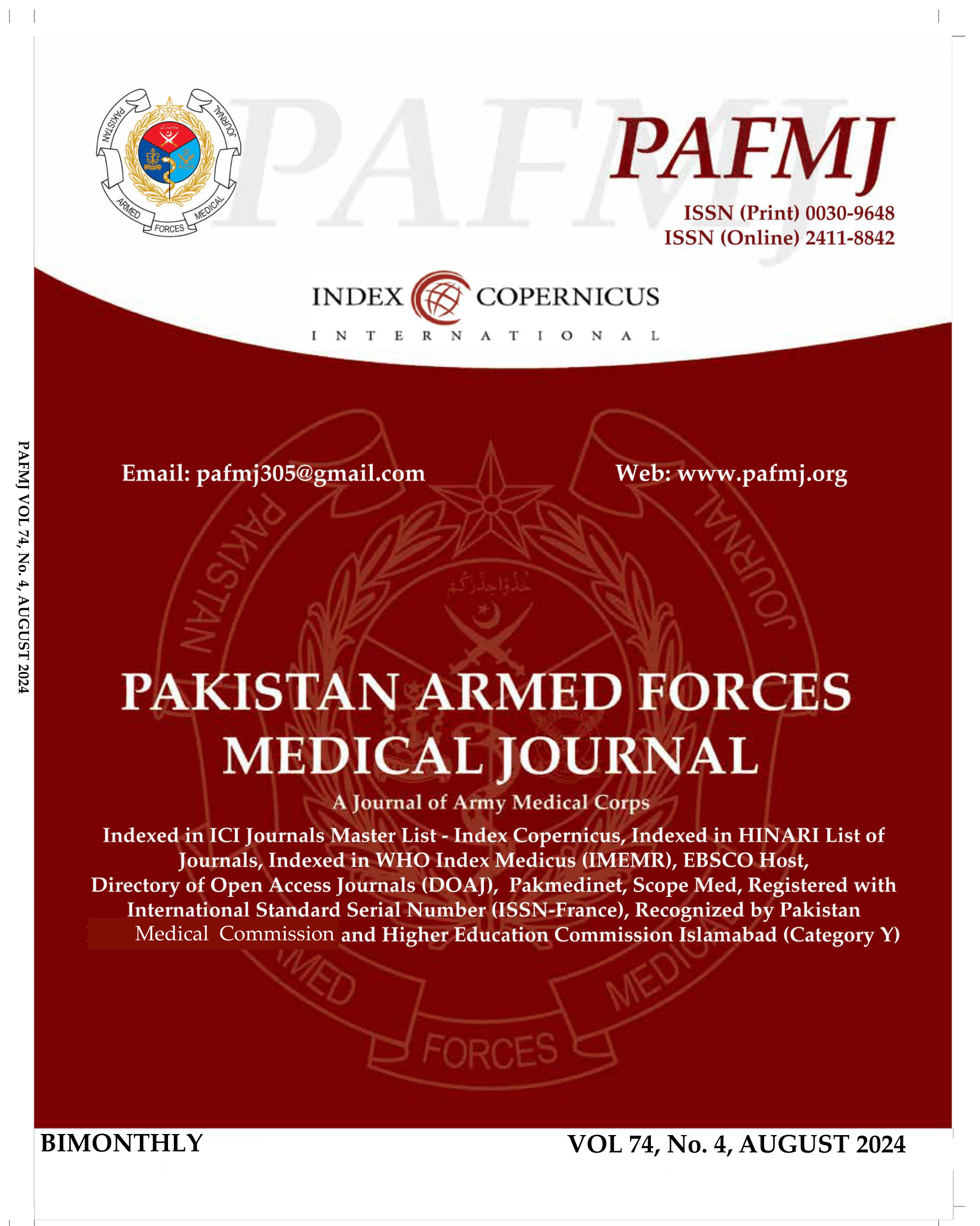Adverse Sequential Organ Failure Assessment Score as a Predictor of Mortality in Patients Requiring Critical Care in Pakistan
DOI:
https://doi.org/10.51253/pafmj.v74i4.10067Keywords:
Critical care, Mortality, Sensitivity, Specificity, SOFA score.Abstract
Objective: To determine the sensitivity, specificity, and diagnostic accuracy of the Sequential Organ Failure Assessment score in predicting one-month mortality in patients requiring critical care.
Study Design: Cross-sectional validation study.
Place and Duration of Study: Department of Surgery, Combined Military Hospital, Rawalpindi, Pakistan Apr to Oct 2020.
Methodology: This study was conducted on 173 patients requiring intensive care. All patients aged between 20 and 70 years diagnosed with disorders secondary to traumatic causes or otherwise who were admitted for critical care were included. Patients were assessed at the time of admission to the intensive care unit, and their Sequential Organ Failure Assessment scores were calculated. A cut-off level of ≥7 was considered to be a high risk for mortality within thirty days of admission. All patients were followed up for thirty days for the mortality.
Results: Mean age of our patients was 43.04±11.26 years, of whom 109(60.6%) patients were male. A SOFA score of ≥7 in predicting the mortality within thirty days of admission for critical care carried a sensitivity of 31.40%, a specificity of 25.53%, a positive predictive value of 27.84%, a negative predictive value of 28.92% and a diagnostic accuracy of 28.33%.
Conclusion: The Sequential Organ Failure Assessment score lacks the diagnostic accuracy to precisely predict the mortality in critically ill patients within thirty days of developing the requirement for critical care.
Downloads
References
Vincent JL. The continuum of critical care. Crit Care 2019; 23(Suppl 1): 122. https://doi.org/10.1186/s13054-019-2393-x
Crawford AM, Shiferaw AA, Ntambwe P, Milan AO, Khalid K, Rubio R, et al. Global critical care: a call to action. Crit Care 2023; 27(1): 28. https://doi.org/10.1186/s13054-022-04296-3
Eya J, Ejikem M, Ogamba C. Admission and Mortality Patterns in Intensive Care Delivery at Enugu State University of Science and Technology Teaching Hospital: A Three-Year Retrospective Study. Cureus 2022; 14(7): e27195.
https://doi.org/10.7759/cureus.27195
Johnson AEW, Mark RG. Real-time mortality prediction in the Intensive Care Unit. AMIA Annu Symp Proc 2018; 2017(1): 994-1003.
Quintairos A, Pilcher D, Salluh JIF. ICU scoring systems. Intensive Care Med 2022: 1–3.
https://doi.org/10.1007/s00134-022-06914-8
Jana S, Dasgupta T, Dey L. Predicting medical events and ICU requirements using a multimodal multiobjective transformer network. Exp Biol Med 2022; 247(22): 1988-2002.
https://doi.org/10.1177/15353702221126559
Sinuff T, Adhikari NK, Cook DJ, Schünemann HJ, Griffith LE, Rocker G, et al. Mortality predictions in the intensive care unit: comparing physicians with scoring systems. Crit Care Med 2006; 34(3): 878-885.
https://doi.org/10.1097/01.CCM.0000201881.58644.41
Li J, Liu S, Hu Y, Zhu L, Mao Y, Liu J, et al. Predicting Mortality in Intensive Care Unit Patients With Heart Failure Using an Interpretable Machine Learning Model: Retrospective Cohort Study. J Med Internet Res 2022; 24(8): e38082.
Moreno R, Rhodes A, Piquilloud L, Hernandez G, Takala J, Gershengorn HB, et al. The Sequential Organ Failure Assessment (SOFA) Score: has the time come for an update? Crit Care 2023; 27(1): 15. https://doi.org/10.1186/s13054-022-04290-9
Moreno R, Rhodes A, Piquilloud L, Hernandez G, Takala J, Gershengorn HB, et al. The Sequential Organ Failure Assessment (SOFA) Score: has the time come for an update? Crit Care 2023; 27(1): 15. https://doi.org/10.1186/s13054-022-04290-9
Safari S, Shojaee M, Rahmati F, Barartloo A, Hahshemi B, Forouzanfar MM, et al. Accuracy of SOFA score in prediction of 30-day outcome of critically ill patients. Turk J Emerg Med 2016; 16(4): 146-150. https://doi.org/10.1016/j.tjem.2016.09.005
López-Izquierdo R, Brio-Ibañez Pd, Martín-Rodríguez F, Mohedano-Moriano A, Polonio-López B, Maestre-Miquel C, et al. Role of SOFA and SOFA Scoring Systems for Predicting In-Hospital Risk of Deterioration in the Emergency Department. Int J Environ Res Public Health 2020; 17(22): 8367.
https://doi.org/10.3390/ijerph17228367
Mehta P, Patil S. A comparative study to evaluate use of apache II and SOFA score in sepsis patients in intensive care unit of a tertiary level hospital in western Maharashtra. Int J Health Sci 2022; 6(S1): 4078-4089.
https://doi.org/10.53730/ijhs.v6nS1.5747
Lu P, Cao Z, Gu H, Li Z, Wang Y, Cui L, et al. Association of sex and age with in-hospital mortality and complications of patients with intracerebral hemorrhage: A study from the Chinese Stroke Center Alliance. Brain Behav 2023; 13(1): e2846.
https://doi.org/10.1002/brb3.2846
Bubenek-Turconi SI, Andrei S, Văleanu L, Ştefan MG, Grigoraş I, Copotoiu S, et al; COVATI-RO Collaborative. Clinical characteristics and factors associated with ICU mortality during the first year of the SARS-Cov-2 pandemic in Romania: A prospective, cohort, multicentre study of 9000 patients. Eur J Anaesthesiol 2023; 40(1): 4-12.
https://doi.org/10.1097/EJA.0000000000001776
Hollinger A, Gayat E, Féliot E, Paugam-Burtz C, Fournier MC, Duranteau J, et al; FROG ICU study investigators. Gender and survival of critically ill patients: results from the FROG-ICU study. Ann Intensive Care 2019; 9(1): 43.
https://doi.org/10.1186/s13613-019-0514-y
Lat TI, McGraw MK, White HD. Gender Differences in Critical Illness and Critical Care Research. Clin Chest Med. 2021 Sep; 42(3): 543-555.
https://doi.org/10.1016/j.ccm.2021.04.012.
Bedada AG, Tarpley MJ, Tarpley JL. The characteristics and outcomes of trauma admissions to an adult general surgery ward in a tertiary teaching hospital. Afr J Emerg Med 2021; 11(2): 303-308.
https://doi.org/10.1016/j.afjem.2021.04.002
Khwannimit B, Bhurayanontachai R, Vattanavanit V. Ability of a modified Sequential Organ Failure Assessment score to predict mortality among sepsis patients in a resource-limited setting. Acute Crit Care 2022; 37(3): 363-371.
Downloads
Published
Issue
Section
License
Copyright (c) 2024 Ali Abbas Janjua, Rohan Qamar, Ayra Arshad, Tariq Farani, Syed Muhammad Nauman, Ali Chand

This work is licensed under a Creative Commons Attribution-NonCommercial 4.0 International License.















